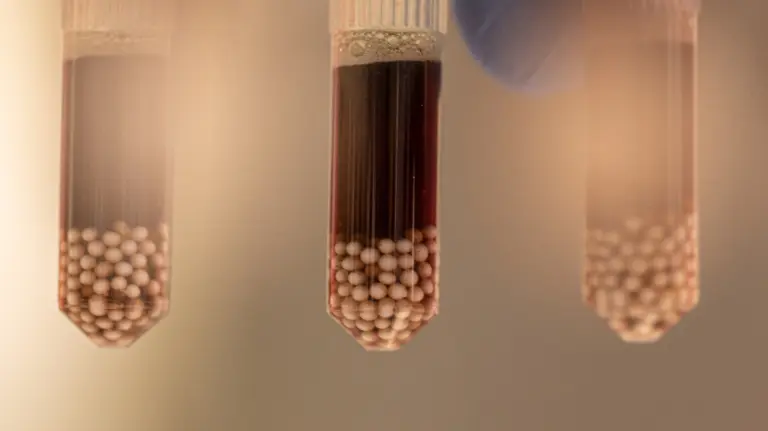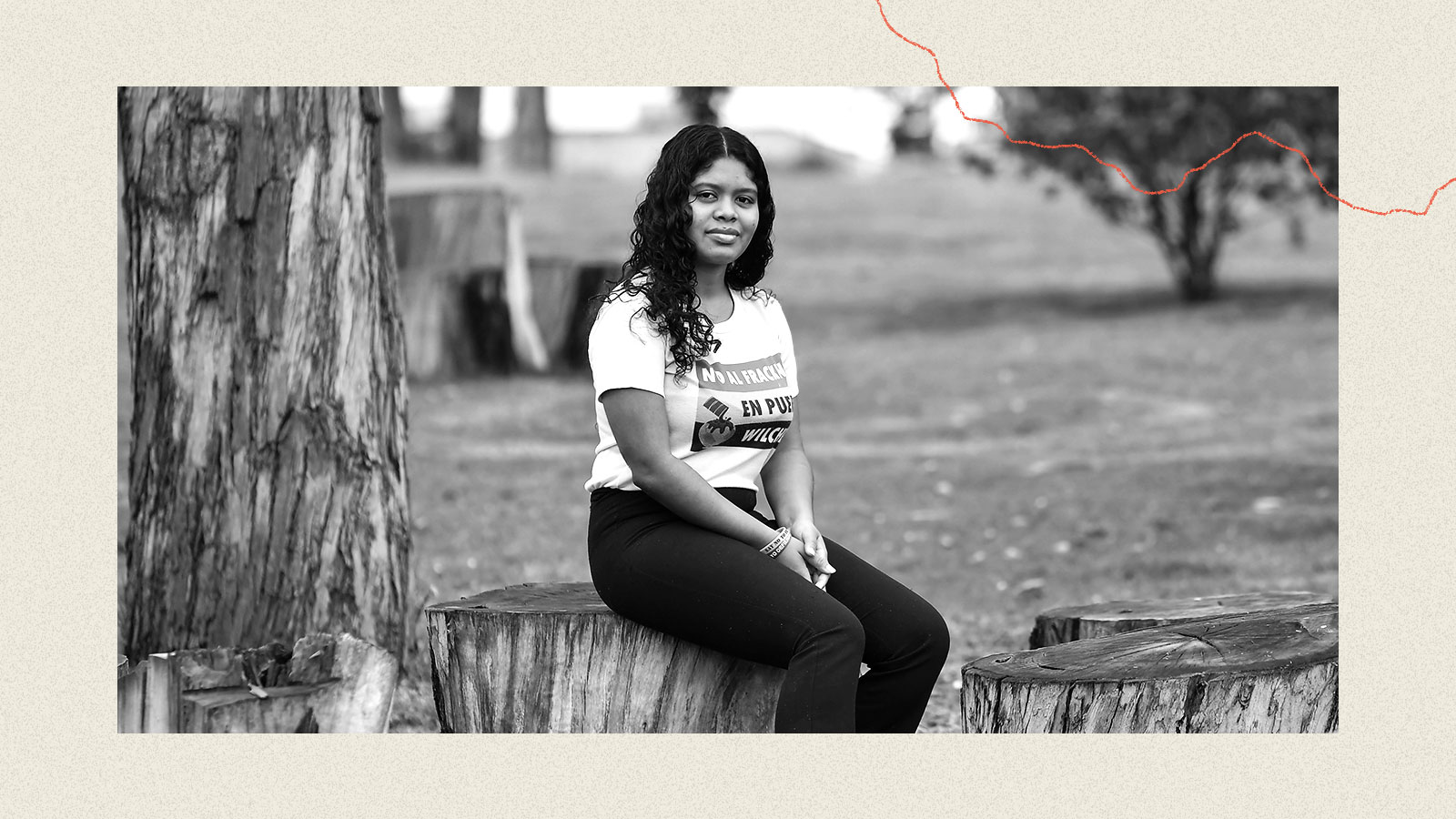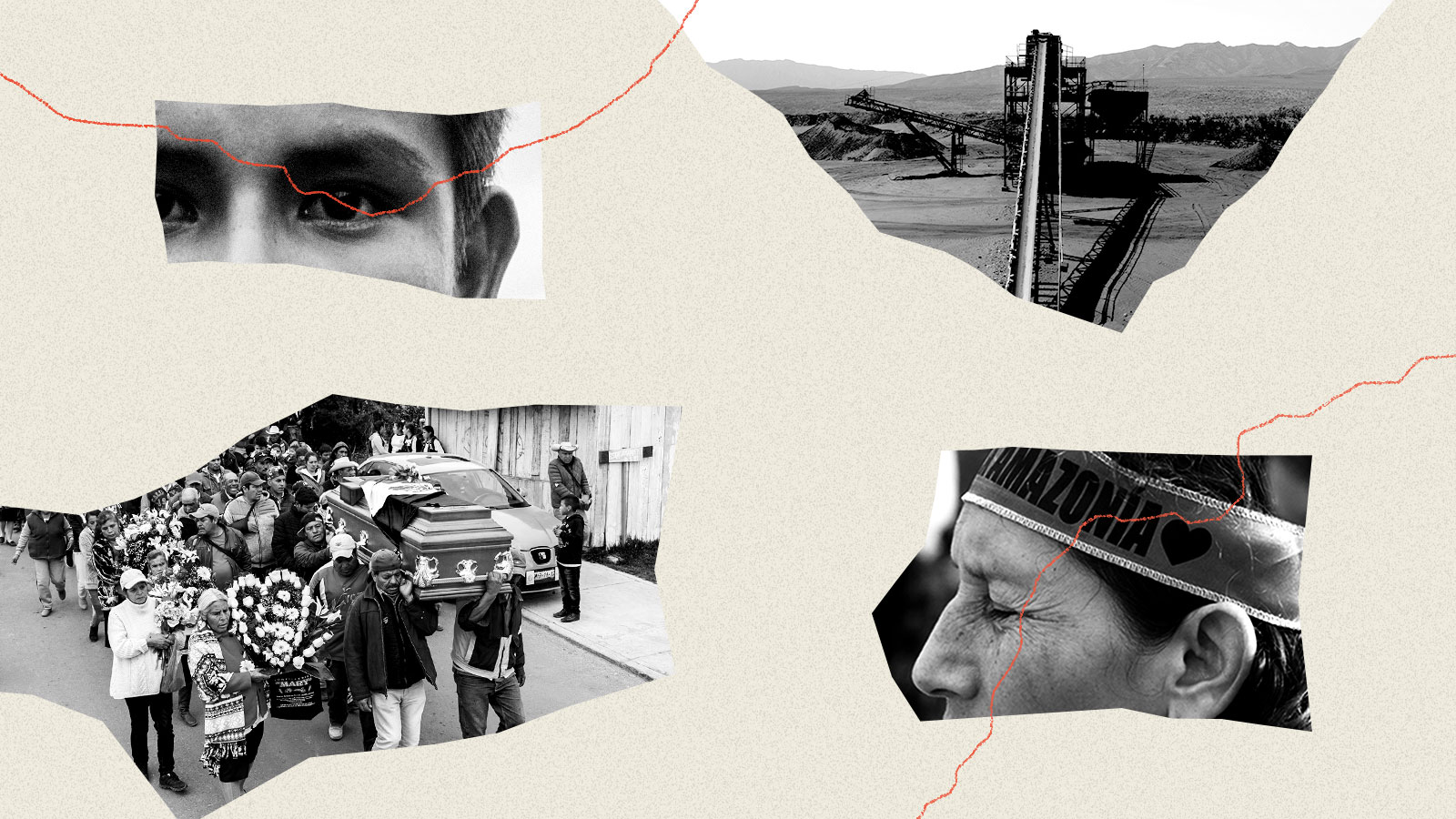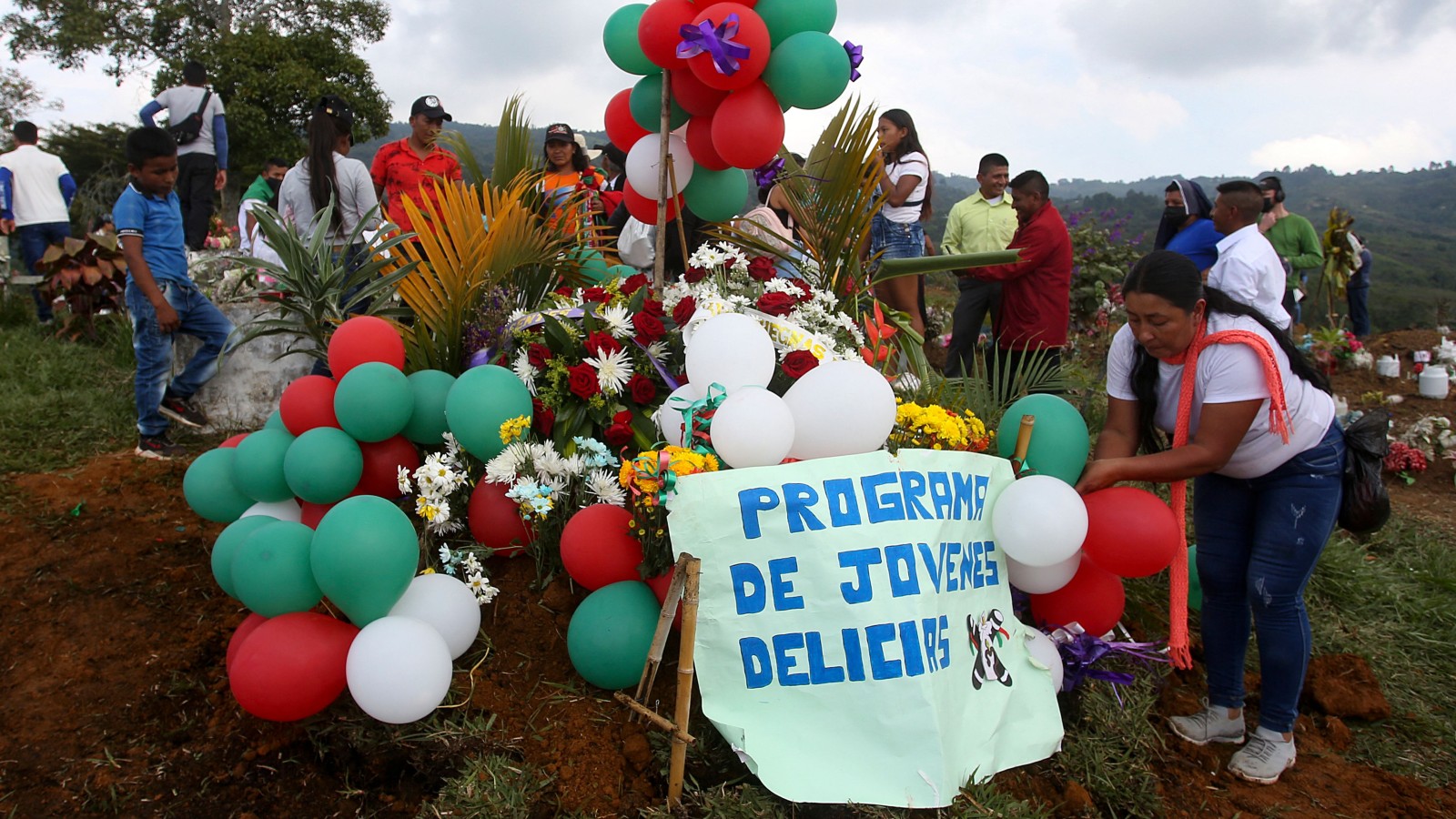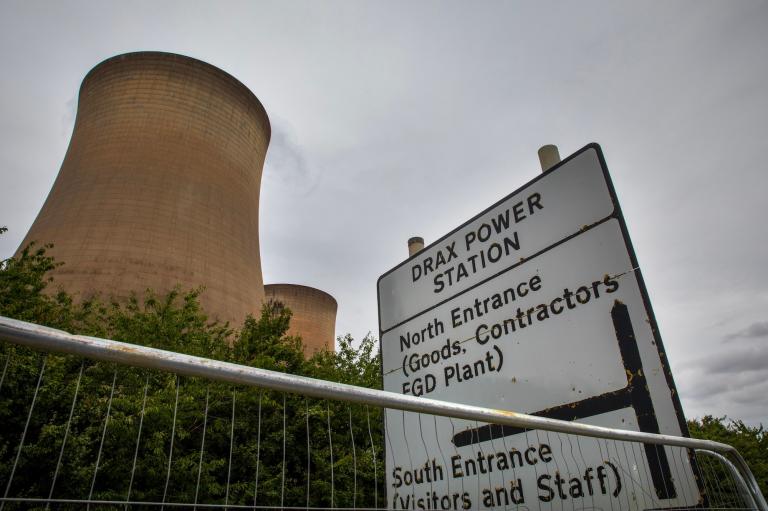Yuvelis Natalia Morales Blanco, a Colombian environmental advocate, received her first death threat at 19. Now 23, Morales Blanco, the public face of the country’s youth-led fight against fracking, finds herself at a crucial intersection: Not only does she live in the most dangerous country in the world to be an environmental leader, but also, according to a 2021 global survey, she belongs to an age group disproportionately affected by the psychological burdens of the climate crisis — a crisis that, in turn, will hit rural communities in the Global South like hers the hardest.
Colombia has been embroiled in a fierce debate over the future of fossil fuel extraction, specifically whether to utilize fracking or hydraulic fracturing, the process of injecting a high-pressure liquid into rocks to extract oil or gas. In 2019, then-President Iván Duque announced four pilot projects to determine fracking’s viability on a large scale — two of which were slated for Morales Blanco’s hometown, Puerto Wilches, a small community in the country’s northeast corner, on the banks of the Magdalena River. Attempts to ban the practice have failed in Congress, and although the projects are at a temporary standstill, they could restart if political winds shift in the 2026 presidential election.
In an interview, Morales Blanco, the daughter of a fisherman, details her fight to stop fracking in Puerto Wilches and nationwide, her struggles with mental health following years of persistent threats and violence, and the lack of recognition and institutional support available to environmental leaders.
This firsthand account includes graphic references to violence and self-harm. The interview has been edited for length and clarity.
In 2019, a group of local kids, college students, came and invited [my friends and me] to a meeting. In the eyes of everyone else in town, they were social outcasts. A community leader told me, “Yuve, don’t go. Think about your mother … it’s dangerous.”
I didn’t go, but I saw pictures of the event and they had signs that read, “Say No to Fracking.” Fracking? I had no idea. Then, my Facebook homepage started filling with stuff about it and a group called Fracking Free Colombia Alliance started calling for meetings. I started going because I wanted to understand. It touched on everything I’ve always cared about — protecting our biodiversity, our river, and our town.
We were leaving after the second or third meeting, and a man and woman passed by. They saw we were really happy, full of energy, and they told us, “You’re gonna get yourselves killed.” Our mindset changed. It wasn’t a playful thing anymore. I’m from a town where people are killed, and they tally the numbers. The idea of us being little heroes [by being activists, by stopping fracking] crumbled from then on.
Doing this work, I discovered abilities in myself that I didn’t know I had — leadership, instant planning, being resourceful. Things that start to awaken in you, I guess, and I said, “This is it.” That’s how Agua Wil, the youth movement against fracking in Puerto Wilches, was born.
We started doing door-to-door promotion, going to all the neighborhoods, and talking to everyone. It was two weeks of almost no sleep. There was never a moment of sadness because there was a very beautiful sentiment, as if of fraternity, very veintejulístico [a reference to Colombia’s independence day on July 20], very of “this homeland that is ours!”
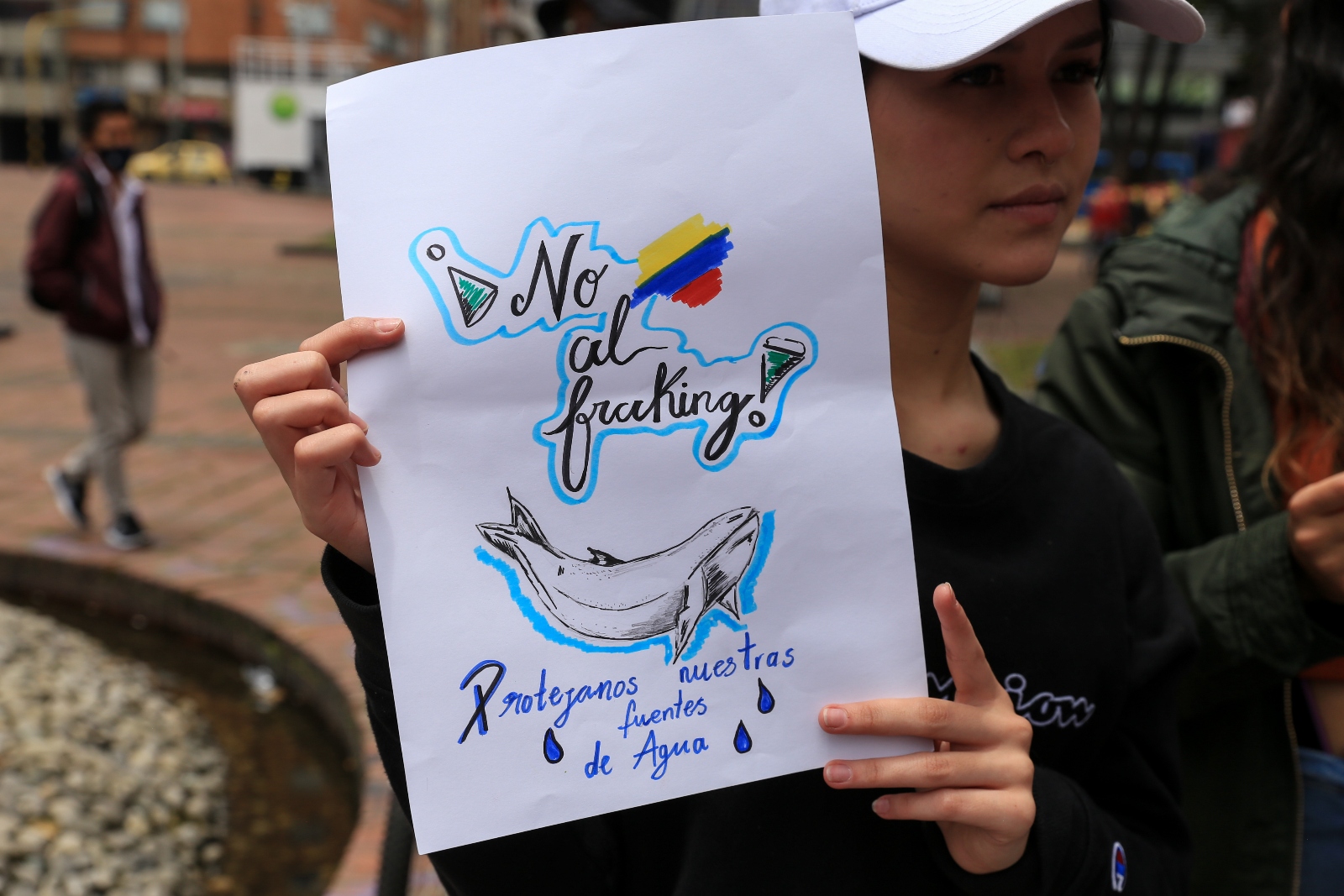
The mayor started to call us for meetings. Then the ombudsman asked us what we were doing and called us “troublemakers.” Rallies began to take place at Ecopetrol, the state oil company proposing the fracking project. At first, I kept my parents out of it, but one time, my mom told me, “You’re not going to these things anymore. I don’t want you to get killed.”
Because of this, we thought, “No one’s gonna come to the march.” Who would walk with someone tagged a “guerrilla rebel” in a paramilitary town? But the day came, and as I’m arriving, the bike is turning onto the park, I see a crowd. Tears started streaming down my face. We were just kids who opposed Ecopetrol and ExxonMobil.
The parade was immense. People came from all over — from cities like Bucaramanga and Barrancabermeja, from universities, those against fracking in the mountain town of Cajamarca in the páramo, and those who opposed it in the nearby town of San Martín. National and international media were there. It was December, so we transformed Christmas carols into protest songs. It was the innocent beginning.
On December 24, at midnight, the government and Ecopetrol still signed the contracts for the fracking pilot projects. It was such a downfall. In Congress, they realized what had happened and we got an email that said, “Dr. Yuvelis, you’re invited to join the public hearing on fracking.” My friends from Agua Wil told me, “You’re the one who has to do it. People identify with you, and you speak so beautifully.”
The hearing was January 29, 2021. I was nervous. There is no internet at my house, so I went to a friend’s. I had such a crappy connection that I couldn’t turn on the camera. They introduced me as “Dr. Yuvelis Natalia,” and the first thing I said was, “First of all, I’m not a doctor” — I went in with irreverence from minute one — and I started talking. I said that even though we [Puerto Wilches] had been an oil-producing town for more than 70 years, we did not have a quality education system, we did not have a decent hospital. Public safety was nonexistent. We were a town bringing wealth to an entire nation that turned a blind eye to us. Then, in the end, I said: “Centuries ago, you came, you traded us a mirror, and we gave you all the wealth. Today, that gold is water, and we are not going to give it up for little mirrors.” For better or for worse, everybody started to talk about it — they had never had this type of testimony from Wilches, much less from a woman, much less from a young woman, much less from a Black woman.
Threats began that same day.
At night, around 9 or 10, I was at home watching TV and eating something. My mom was at work. It was only my little sister and me. I lived on a main street, so there was always a lot of traffic. I heard a motorcycle stop in front of our home. I was sitting on a rocking chair with my legs up, when suddenly I saw a man standing next to me. I stood up instantly. My hair was super long, and he stroked it and said, “You’re very pretty. It would be a shame if something were to happen to you. Stop fucking around with that fracking stuff because we will kill you.”
It happened in the blink of an eye, but to me, it lasted for hours. I felt very abused. They had touched me, they had invaded my space, they had entered my house.
After I made sure my sister was okay, I locked the front door. I laid her down next to me. I didn’t sleep that night. When dawn broke, I started crying. I wrote Héctor, a member of the Alliance and part of a human rights organization called Credhos. He said, “Tell the rest of the group.” They said, “Go to Barrancabermeja [the nearest city], and file a police report.”
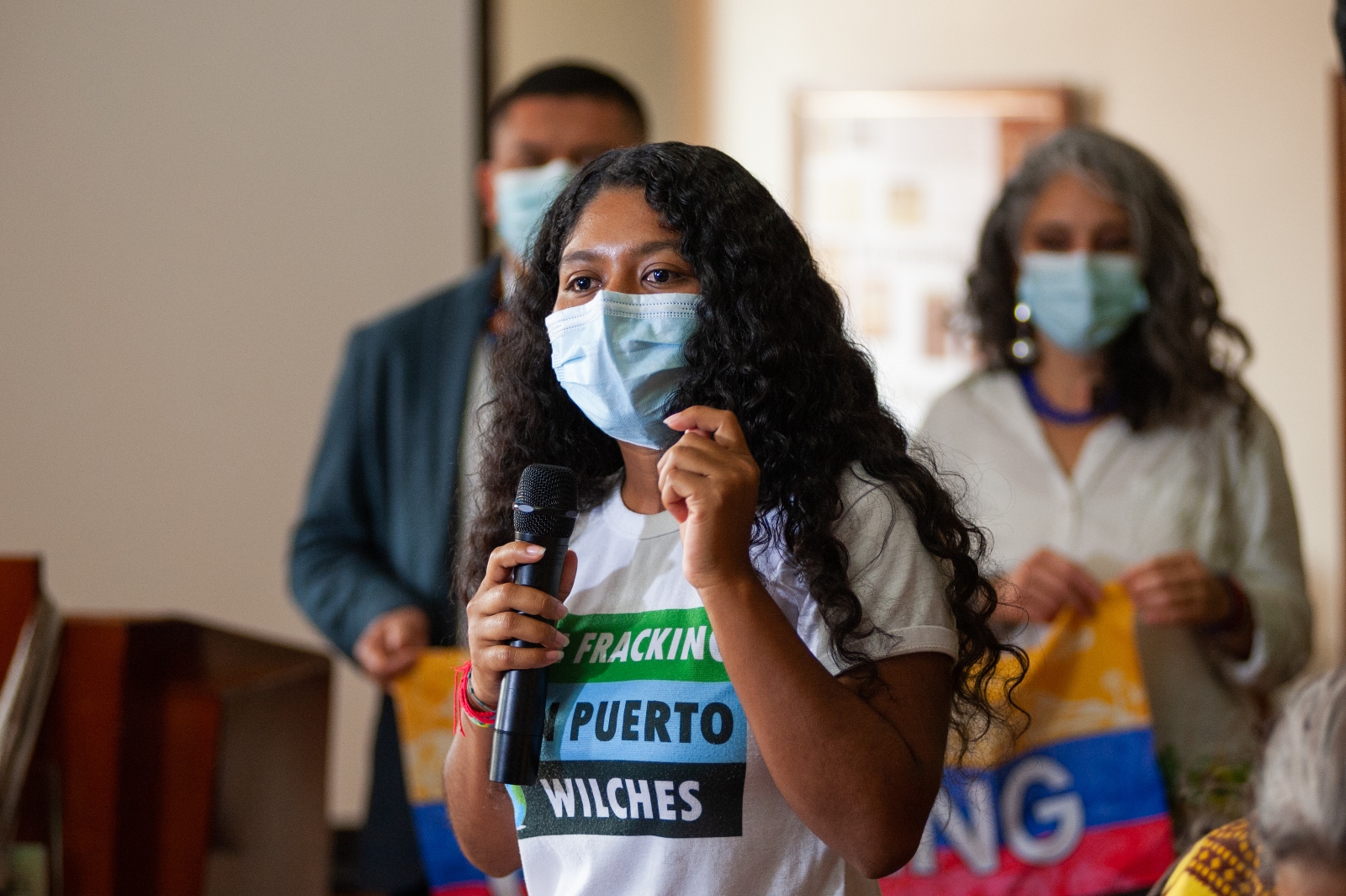
Sebastian Barros/NurPhoto
My mom asked where I was going. I never told her. When I arrived at Credhos (Corporación Regional Para La Defensa De Los Derechos Humanos), the first thing Iván, its president, did was to hold me. He said, “Everything will be alright.” It was as if I had a brooch, and it had been unfastened. I started crying. The tears just came out. I said nothing. They gave me water. They hugged me. I said I was going back to Wilches. “Stay. What are you looking for there?,” they asked. “If you leave, we won’t be able to protect you. You’ll be alone.” I was like, “I don’t care.”
Violence against us got worse.
They would call me, telling me to stop talking about fracking. But it wasn’t just me, they also called the others.
One time, someone was about to hand me a soda and made a gun sign to me.
They would go to my house.
I was on a motorcycle with a friend, and they would chase us.
Another day, we were checking the locations for the fracking pilot projects when a white pickup truck without license plates passed by us. They told us, “They are going to kill you and only vultures will find you.”
A friend of mine got married. At the wedding, she told me, “Yuvelis, we didn’t invite those guys over there. I thought they were with you because they have been looking at you for a while.”
The Yuvelis I had been before went to shit because I became very fearful. I could no longer go out. I didn’t even know who I was amidst the fear of persecution and the looming threat that I was going to be killed when I had just turned 20. I started to get an itch, a scratch. My skin started to become blotchy. My period also changed, suddenly I would have hemorrhages.
On top of everything, my mom didn’t know about any of it. She found out when someone told her, “I heard your daughter is under death threat.” My mother said to me, “Yuvelis, is it true?” She started crying. I told her, “Yes, mommy.” And she said, “You see, Yuvelis, I told you.” That was the saddest thing: I felt guilty, even though I was the victim. She told me, “You are not going to stay here because, at some point, they will kill you and kill all of us.”
The Alliance bought me a bus ticket, and I went to Bogotá, the capital of Colombia. The ticket did not even have my name on it.
A friend offered me shelter in La Perseverancia neighborhood. He told me, “Just take a cab and go to this address.” A cab? In Wilches, you just take a motorcycle or you walk. I was so scared, I didn’t know where I was. I was terribly cold. I didn’t own any cold-weather clothes. I arrived at dawn, and he hugged me. I didn’t talk. He gave me a ruana [a cold-weather poncho] and laid me down in a sleeping bag on a sofa. I fell asleep.
I felt defeated. For me, depression and anxiety concentrate on my fingertips. I started tearing the skin off my fingers. It was a time of my life marked by extremes: I wouldn’t cry at all, and then I would cry a lot. I started eating like an animal, then I wouldn’t eat at all. I got COVID. I fought for life, but for the lives of others, not my own.
When I was hospitalized, it was a reality check: I realized people were lying on the ground, cold, without blankets, crowded together [in the hospital corridors]. I said, “I’m not coming back here.”
A network of people willing to be there formed around me. I was very cared for, very supported, very understood in the midst of the crying, the screaming, the silences, and the sudden uncontrollable urge to talk. They were willing to sit down and watch me cry, to cook for me. People who had no clue how to dance organized dancing parties because they knew I loved it. Whatever it took to spark a light in me.
Despite all the trauma and the psychological shock I was experiencing, there was something I never stopped doing, and it saved my life: Talking. I felt the need to tell the world that their extractive realities were costing me my life. I started saying that fighting for life in Colombia takes away your own. Soon, there were people who began sharing with me about their own struggles seeking help.
Little by little, in 2021, I returned to Wilches. I realized all my friends had moved on [with their lives], but the life I had built wasn’t mine anymore, it belonged to the anti-fracking movement, to the public scorn, to everyone but me.
We never stopped working. The government was increasingly saying, “We will do fracking — and that’s it.” We talked back, “You’ll have to kill us then.” In January 2022, the dates of the ANLA [National Environmental Licensing Agency] visits to grant the environmental permits to the pilot projects were announced. We started to organize like crazy.
One day, before an important meeting at the city council, two guys with military garb came to my house and told me, “You already know: We are going to kill you.”
I became a rock. I had built within me a figure that had fractured into two sides: the militant and the personal. My high-functioning part has always been the militant. She was always there, committed. Everyone was expecting me to say, “I don’t want to be here anymore.” But I never did; I kept thinking about how I left running the year before.
But it was all a lie. Inside, I was dead, wanting the Earth to swallow me and spit me somewhere else.
One night, we went to dinner with the Unión Sindical Obrera (National Labor Union). They told me, “We are not famous for being stubborn and waiting to be killed. We are famous because when it’s our turn to leave, we leave and continue fighting from somewhere else.” With that came the proposal to become part of an organization with a collective security scheme because Agua Wil was never given one by the government.
One day, I was going home to get some clothes for a hearing. All of a sudden, the bodyguards come into my home, grab my arm, and throw me into our van. We’re on the corner when my mom calls and said, “Natalia, where are you? Two armed men just came in here asking for you.”
The bodyguards told me to curl up and they started putting on my bulletproof vest. They started calling the police, but the Wilches police never answered. We were alone. We started to go in circles around town, trying to shake them off. At one point, I thought: I hope they kill us quickly. I hope they shoot me in the head because I don’t want to suffer. That thought still haunts me. I just wanted everything to stop. I wanted those around me to stop being afraid and escaping whenever they were around me. I wanted to stop putting other lives at risk.
After that, the Alliance talked to the French Embassy. They told me, “You do not have a security scheme. Your house is made of wood planks. The government did nothing, and is not going to do anything, because the president wants fracking to be done, and today you stand against fracking in Colombia. They are going to kill you. You are leaving. You are going to France.”
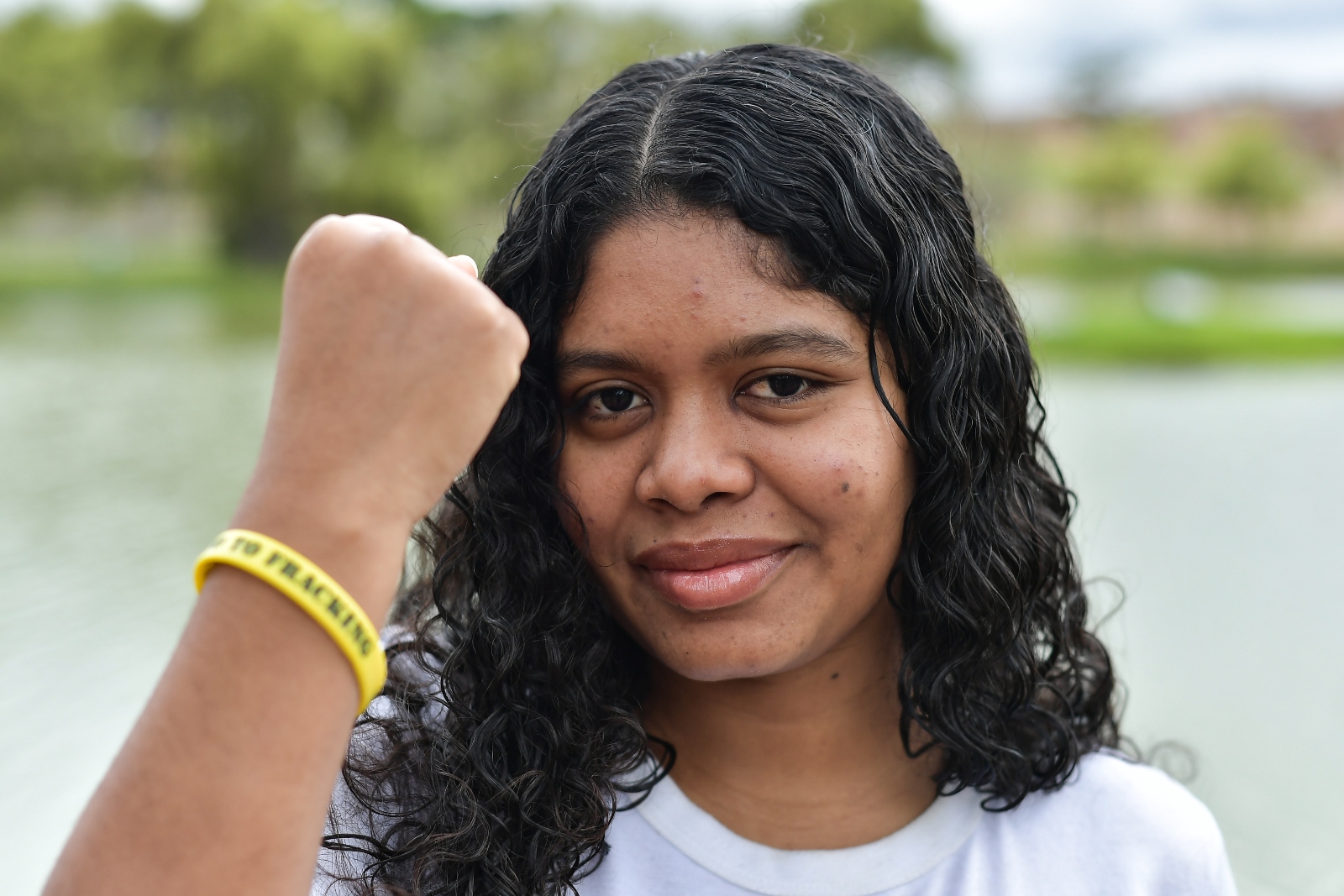
We left the next morning at about 4 a.m.; it was still dark. The bodyguards went into the airport with weapons and did not leave me alone until I got on the plane to Bogotá. On the plane, I was received by other security escorts and in Bogotá, by the embassy escorts. They took me to a meeting with the French ambassador to Colombia, and he told me, “We admire you, we’ll protect you, and you’ll have everything in France, so don’t worry.”
We landed, and everything looked inhospitable. There was no sun. A bunch of people were waiting for me with signs with my name on them. Leaving the airport, they were talking to me, all excited. And I just looked out the window at all the dead trees. They asked, “Are you happy?” And I said, “No.” I didn’t talk to them at all. And they understood. I just wanted to rest.
All that year was like a fog. It was the golden dream: You have an apartment, you have a scholarship, you can travel to other countries, but I felt misunderstood — because of the language and because of everything I had gone through to get there. I had no one to talk to. I began to demand psychological counseling because I was in very bad shape. So they looked for someone, but that person spoke Portuguese, not Spanish. He didn’t understand anything; it was awful and only made me feel worse. I survived because I found others in exile. But I always said I wanted to go back, no matter how, I wanted to go back home. I didn’t have any closure. My work was unfinished, and because of that, I was also unfinished. I didn’t have the chance to say goodbye to my mom, my sisters and brothers, or my dad. I didn’t have the chance to say goodbye to the river. My life wasn’t mine anymore, and I wanted it to be. I came back to Colombia in December 2022.
Breaking down so many times has helped me rebuild myself in a thousand ways. I decided to take a stand, to be strong, but also to have a soft heart, which is sometimes what many militants lose: empathy towards their own lives.
I decided that the militant half and the other half should be one. I am Yuvelis Natalia Morales Blanco, the militant against fracking who feels a lot, suffers a lot, loves a lot, and can stand for something — and for herself.
Editor’s note: If you or someone you know may be considering suicide, contact the 988 Suicide & Crisis Lifeline by calling or texting 9-8-8, or the Crisis Text Line by texting HOME to 741741.
